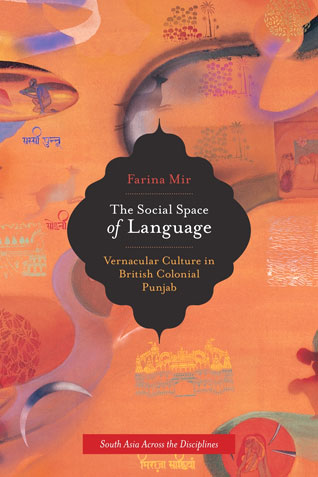Books
The Social Space of Language:
Vernacular Culture in British Colonial Punjab
Farina Mir
Book Review by PERMANENT BLACK
This is a presentation in the continuing series on sikhchic.com titled “SCHOLARLY PURSUITS”.
THE SOCIAL SPACE OF LANGUAGE: VERNACULAR CULTURE IN BRITISH COLONIAL PUNJAB, by Farina Mir. University of California Press, Berkeley, USA, 2010. Hardback, pp 294, Rs. 695. ISBN 81-7824-307-5
In December 2002, it was announced that Farina Mir's dissertation titled 'The Social Space of Language' was joint winner of a Dissertation Award for that year, given to the best doctoral dissertation in modern Indian studies at any American university.
Confirming the stature and importance of Farina Mir's scholarship, the revised version of her dissertation, published jointly by Permanent Black and the University of California Press, was the recipient of the prestigious American Historical Association's Richards Book Prize for 2011.
In early 2012, the book won the Association for Asian Studies 2012 Bernard S. Cohn Book Prize, given for the best first book on South Asia in any discipline.
This rich cultural history set in Punjab examines a little-studied body of popular literature to illustrate both the durability of a vernacular literary tradition and the limits of colonial dominance in British India.
Farina Mir asks how qisse, a vibrant genre of epics and romances, flourished in colonial Punjab despite British efforts to marginalize the Punjabi language. She explores topics including Punjabi linguistic practices, print and performance, and the symbolic content of qisse.
She finds that although the British denied Punjabi language and literature almost all forms of state patronage, the resilience of this popular genre came from its old but dynamic corpus of stories, their representations of place, and the moral sensibility that suffused them.
This multidisciplinary study reframes inquiry into cultural formations in late-colonial north India away from a focus on religious communal identities and nationalist politics and towards a widespread, ecumenical, and place-centred poetics of belonging in the region.
“Mir's archival work covers and foregrounds the breadth of the story-telling or qissa tradition, great and little, high and low, Sufi, Sikh and Hindu, showing its wide dissemination. Mir’s findings are of immense significance, given the turbulent history of the region in post-independence India and the political turmoil today, particularly on the Pakistani side of the border. Punjabi seldom finds this kind of focus in cultural history.” -- Vasudha Dalmia, University of California, Berkeley
“Farina Mir has given us an outstanding work of literary and cultural history. She skilfully unravels the many versions of the famous folk-tale about ‘Heer and Ranjha’ to illuminate gender, class and community relations in Punjab. This book will compel historians to rethink the links between language, religion and power and to reconsider the contingencies of union and partition in late colonial India.”-- Sugata Bose, Harvard
“Mir makes creative use of archival and folkloric material to tell the history of a composite, modern, and gendered Punjabi self in colonial India that was sadly lost in the welter of partition politics and violence. The story of the legendary lovers ‘Heer and Ranjha’ haunts her narrative like an artistic lament about a lost Punjabi self without in any way compromising the academic quality of her research and the rigour of her exposition. A very significant contribution to South Asian history.” -- Dipesh Chakrabarty, The University of Chicago
“This is a pioneering study. Mir draws upon largely unfamiliar material and suggests new approaches to religio-cultural questions of great importance to South Asianists across a wide disciplinary spectrum.” -- Christopher Shackle, SOAS, University of London
Farina Mir is Assistant Professor of History at the University of Michigan.
[Courtesy: Permanent Black. Edited for sikhchic.com.]
April 16, 2015



